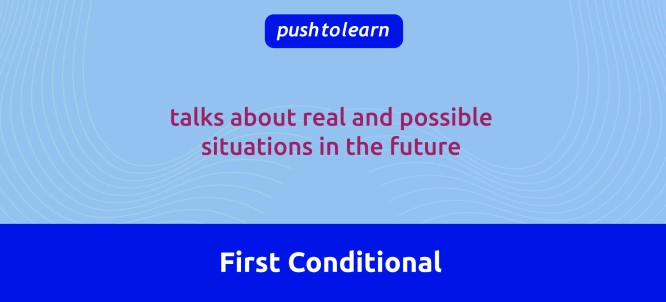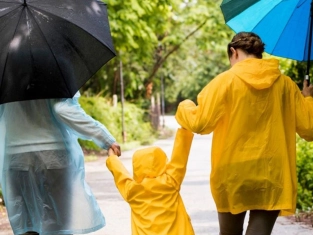by PushtoLearn
Primer Condicional en ingles: reglas, uso y ejercicios
Tabla de contenidos
- Primer Condicional – Ejercicios
- TLDR
- ¿Qué es el Primer Condicional (First Conditional)?
- Estructura del Primer Condicional (First Conditional)
- Variaciones del Primer Condicional
- Primer Condicional (First Conditional) vs. Condicional Cero (Zero Conditional)
- Errores Comunes en el Primer Condicional (First Conditional)
- FAQ
Primer Condicional – Ejercicios
Estos ejercicios se centran en el Primer Condicional
TLDR
✔️ Primer Condicional = Situaciones futuras posibles (If + Presente, Will + Verbo)
✔️ NUNCA uses "will" en la cláusula con "if"
✔️ Usa "might," "can" o "may" en lugar de "will" para diferentes significados
✔️ "Unless" = "If not"

¿Qué es el Primer Condicional (First Conditional)?
El Primer Condicional se usa para:
✔️ Eventos futuros posibles → "If it rains, we will stay inside."
✔️ Consecuencias probables → "If you study, you will pass the exam."
✔️ Advertencias y promesas → "If you touch that, you will get burned!"
Estructura del Primer Condicional (First Conditional)
👉 If + Presente Simple, will + Verbo base
✔️ Ejemplos:
-
If you eat too much, you will feel sick.
-
If she calls me, I will answer.
-
If they win the game, they will be champions.
📌 Consejo: La cláusula con "if" describe la condición (Presente Simple) y la cláusula principal muestra el resultado (will + Verbo base).
Variaciones del Primer Condicional
🔹 Usar "can", "may" o "might" en lugar de "will"
✔️ If you study, you can pass the exam. (Habilidad)
✔️ If you hurry, you might catch the train. (Posibilidad)
✔️ If it’s sunny, we may go to the beach. (Posibilidad)
🔹 Usar imperativos
✔️ If you see Tom, tell him to call me.
✔️ If you finish early, come and help me.
🔹 Usar "unless" (= if not)
✔️ Unless you study, you will fail. (= If you don’t study, you will fail.)
✔️ Unless it rains, we will have a picnic. (= If it doesn’t rain, we will have a picnic.)
Primer Condicional (First Conditional) vs. Condicional Cero (Zero Conditional)
|
Característica |
Primer Condicional |
Condicional Cero |
|
Significado |
Situaciones futuras posibles |
Verdades generales y hechos |
|
Estructura |
If + Presente Simple, Will + Verbo base |
If + Presente Simple, Presente Simple |
|
Ejemplo |
If it rains, we will stay inside. |
If it rains, the ground gets wet. |
|
¿Se puede reemplazar "if" por "when"? |
No, porque el futuro es incierto. |
Sí, porque siempre es cierto. |
📌 Consejo: Si el resultado siempre ocurre, usa el Condicional Cero. Si es posible pero no seguro, usa el Primer Condicional.
Errores Comunes en el Primer Condicional (First Conditional)
|
Error |
Incorrecto |
Correcto |
|
Usar "will" en la cláusula con "if" |
If she will call, I will answer. |
If she calls, I will answer. |
|
Usar el presente en la cláusula de resultado |
If it rains, we stay inside. |
If it rains, we will stay inside. |
|
Usar "would" en lugar de "will" |
If you study, you would pass. |
If you study, you will pass. |
📌 Regla: NUNCA uses "will" después de "if". La cláusula con "if" siempre está en presente simple.
📌 Compara otros condicionales: Condicional Cero, Segundo Condicional, Tercer Condicional, Condicionales Mixtos.
FAQ
¿Puedo usar "will" en la cláusula con "if"?
➡️ No. La cláusula con "if" siempre está en presente simple.
❌ If you will study, you will pass.
✅ If you study, you will pass.
¿Puedo usar "unless" en lugar de "if not"?
➡️ Sí.
✔️ Unless you study, you will fail. (= If you don’t study, you will fail.)
¿Cuál es la diferencia entre "if" y "when" en el Primer Condicional?
➡️ "If" = Situación posible
➡️ "When" = Situación segura
✔️ If it rains, we will stay inside. (Tal vez llueva.)
✔️ When it rains, we stay inside. (Siempre sucede.)
¿Puedo usar "might" o "can" en lugar de "will"?
➡️ Sí, pero cambia el significado.
✔️ If you study, you might pass. (Posibilidad)
✔️ If you study, you can pass. (Habilidad)

